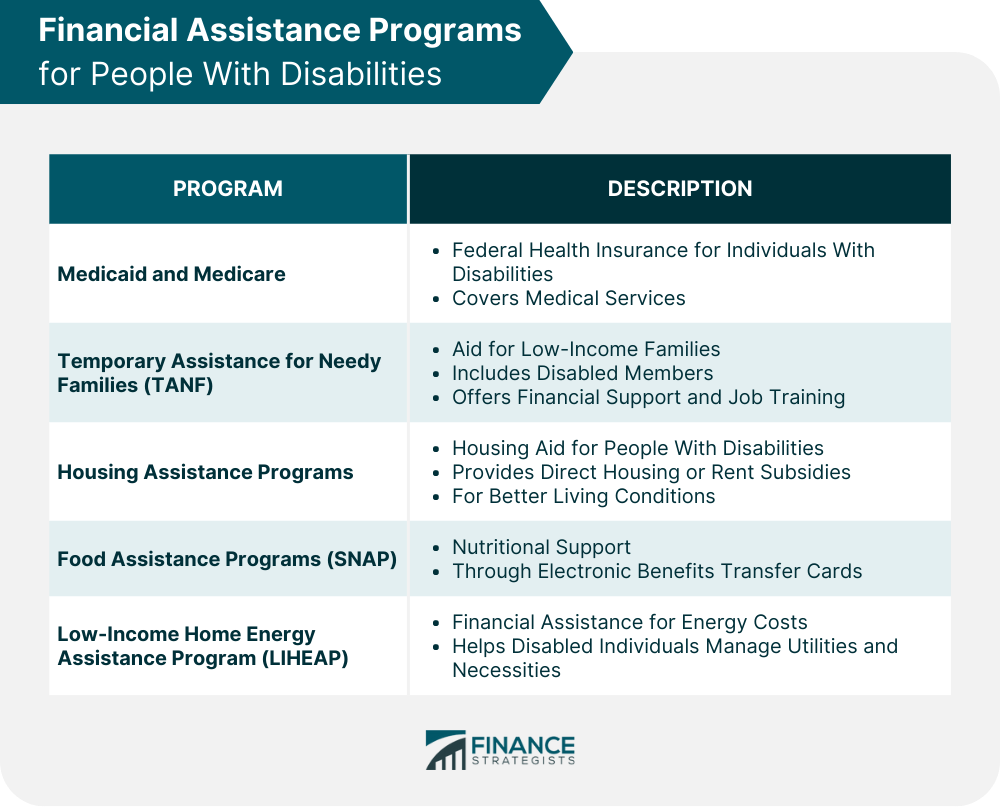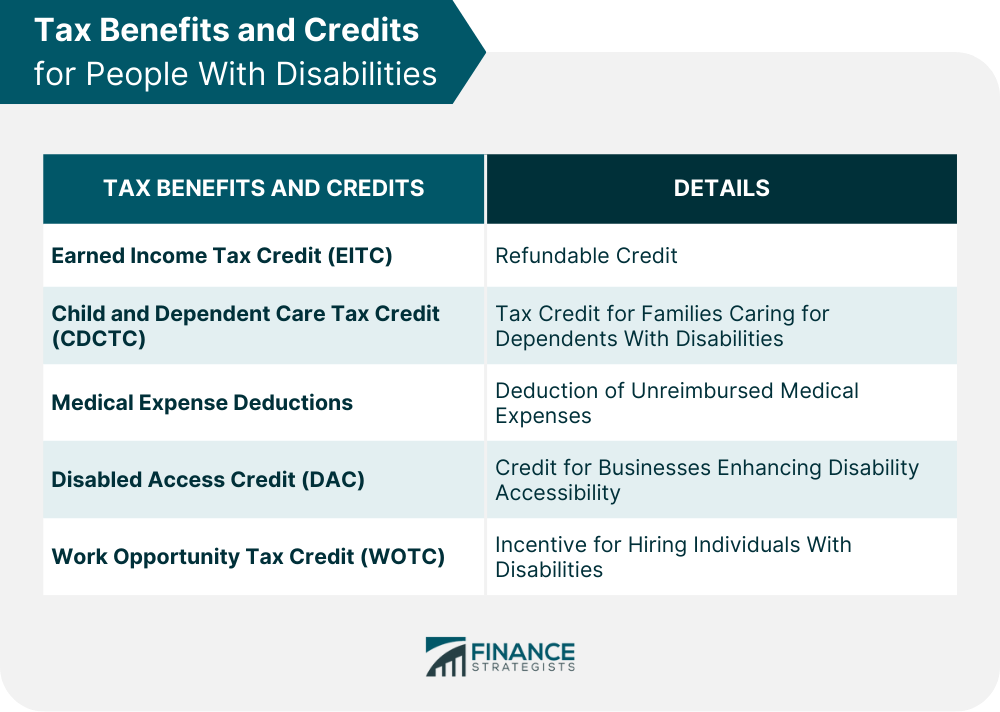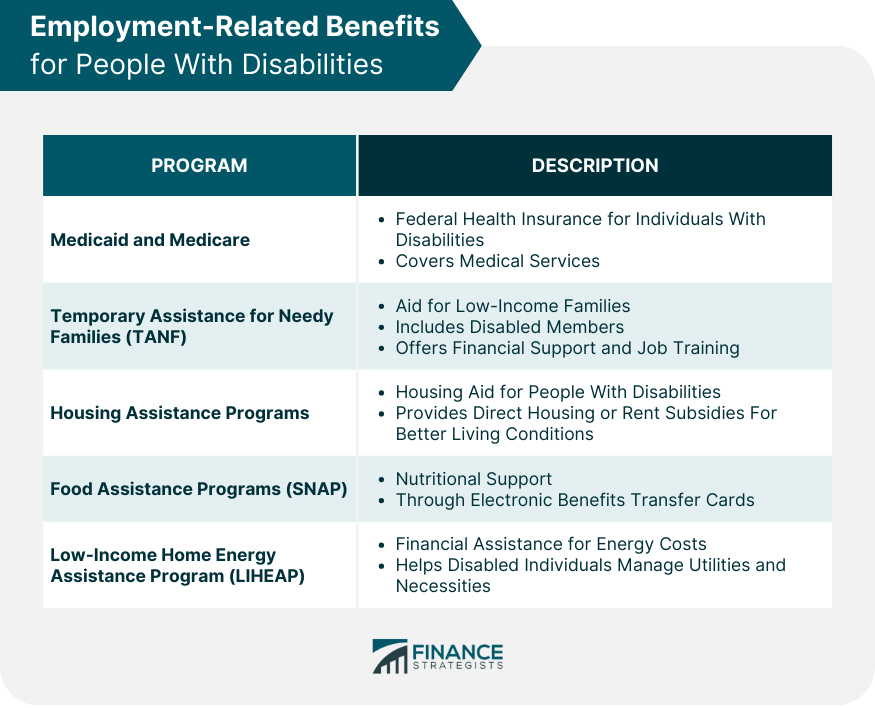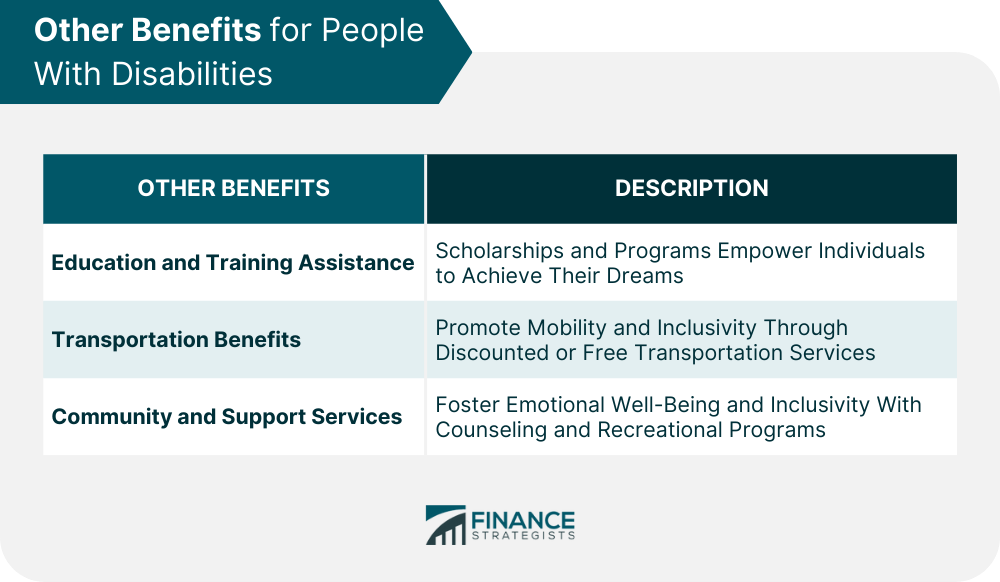Disability benefits refer to financial assistance provided to individuals who are unable to work or earn a sufficient income due to a physical or mental disability. These benefits aim to offset the loss of earning capacity and to help these individuals maintain a reasonable standard of living. They can come from various sources, including government programs, private insurance, or employer-sponsored plans. Typically, eligibility for these benefits is determined by a thorough assessment of the person's medical condition and how it impacts their ability to work. For many people with disabilities, these benefits are not just a source of income, but a lifeline that helps them cope with daily expenses and medical bills. They offer a semblance of financial security and allow individuals to pursue opportunities without being held back by their condition. Medicaid and Medicare are two vital federal programs that provide health insurance to individuals with disabilities. Medicaid, primarily a state-run program with federal guidelines, caters to low-income individuals and families, while Medicare is more focused on seniors and certain disabled individuals under 65. Both programs offer coverage for a range of medical services, including hospital stays, doctor visits, and prescription medications. For those with disabilities, Medicaid and Medicare can substantially ease the financial burden of medical expenses. Furthermore, several states have expanded their Medicaid programs to cover more people, ensuring that individuals with disabilities can access the care they need without incurring insurmountable debt. Temporary Assistance for Needy Families, or TANF, is a federal program that provides financial aid to low-income families, including those with members who have disabilities. It offers temporary financial assistance, job training, and other supportive services to help families achieve self-sufficiency. While TANF is primarily aimed at families with dependent children, it can be a valuable resource for households with disabled members. The support provided by TANF can be a stepping stone to more stable financial situations, enabling families to address immediate needs while also planning for the future. Affordable and accessible housing is often a challenge for people with disabilities. Thankfully, various housing assistance programs are in place to aid those in need. The Department of Housing and Urban Development (HUD) offers programs that either provide direct housing or vouchers to subsidize rent in private housing. Safe, stable housing can greatly enhance the quality of life for someone with a disability. Being in a conducive environment, where one’s special needs are addressed, can lead to improved physical and mental well-being, enabling individuals to focus on other aspects of life like employment and community participation. The Supplemental Nutrition Assistance Program (SNAP), commonly known as food stamps, is a federal initiative that offers nutritional support to low-income individuals and families, including those with disabilities. Recipients are given an Electronic Benefits Transfer (EBT) card, which can be used to purchase groceries. For people with disabilities, maintaining a balanced diet is crucial. SNAP helps ensure that they have access to nutritious food, which can lead to better overall health, reduced medical expenses, and an improved quality of life. LIHEAP provides financial assistance to low-income households struggling to meet their home energy costs. This can include assistance with heating or cooling expenses. For those with disabilities, regulating home temperature can be vital, especially if they have specific medical conditions. Through LIHEAP, eligible individuals receive funds to manage their energy bills, preventing them from having to make difficult decisions between paying for utilities or other essentials like medication or food. The Earned Income Tax Credit (EITC) is a refundable tax credit designed for low-to-moderate-income working individuals and families. It's especially beneficial for people with disabilities who might have limited earning potential. When eligible, these individuals can get a tax refund even if they owe no tax. This credit can provide a significant financial boost, helping individuals with disabilities cover necessary expenses. It's a recognition that, while they may face unique challenges in the workplace, their contributions are valued and should be supported. For families caring for a dependent with a disability, the Child and Dependent Care Tax Credit can be of great help. It offers a tax credit for expenses related to the care of a dependent, allowing a family member to work or look for work. Balancing the demands of employment and caregiving can be challenging. CDCTC eases this burden, providing some financial relief and recognizing the dual roles many family members play. People with disabilities often have higher medical expenses. Fortunately, the IRS allows individuals to deduct unreimbursed medical expenses that exceed a certain percentage of their adjusted gross income. This can include a wide range of expenses, from doctor visits to medical equipment. By taking advantage of this deduction, individuals can alleviate some of the financial stress associated with medical costs, ensuring they get the care they need without undue financial strain. For small businesses aiming to make their establishments more accessible to people with disabilities, the Disabled Access Credit offers a non-refundable credit for certain expenditures. This encourages businesses to be more inclusive, benefiting both the business and the broader community. It's a win-win situation, businesses can cater to a wider audience, and people with disabilities enjoy increased accessibility and participation in their communities. The Work Opportunity Tax Credit incentivizes employers to hire individuals from certain target groups, including people with disabilities. Employers can claim a tax credit for a percentage of the wages paid to these new hires during their first year of employment. By leveraging the WOTC, businesses can benefit from the unique skills and perspectives of a diverse workforce while also enjoying financial incentives. It's a powerful way to promote inclusivity in the workplace. Vocational Rehabilitation programs support individuals with disabilities in achieving their employment goals. These programs offer services like job training, counseling, and job placement assistance. By participating, individuals can gain the skills and confidence needed to enter or re-enter the workforce. For many, these programs represent a path to independence and self-sufficiency. They demonstrate society's commitment to ensuring that everyone, regardless of their physical or mental condition, has the opportunity to contribute and succeed. The Americans with Disabilities Act (ADA) mandates that employers provide reasonable accommodations for employees with disabilities. This can include anything from modifying work schedules to providing assistive technology. The aim is to create an inclusive workplace where everyone can perform their job duties effectively. By offering accommodations, employers foster a diverse and inclusive environment. It's not just about compliance but about recognizing the potential in every individual and creating opportunities for all to thrive. The Ticket to Work program is a free and voluntary program offered by the Social Security Administration. It helps Social Security beneficiaries return to work without jeopardizing their health benefits. By connecting individuals with service providers, the program supports a smooth transition to the workforce. This initiative provides a safety net, allowing individuals to explore employment opportunities without the fear of immediately losing essential benefits. It's a stepping stone to financial independence and improved self-worth. This tax credit is designed to encourage the hiring of individuals with disabilities. Employers can claim this credit when they hire someone with a certified disability and meet certain conditions. It's an incentive that not only benefits businesses but also boosts employment opportunities for those with disabilities. By offering such tax benefits, the government recognizes and promotes the value of an inclusive workplace, where every individual's contribution is cherished. Various scholarships, grants, and programs are available to support their educational pursuits. This assistance not only helps in acquiring academic qualifications but also in developing skills necessary for employment and personal growth. Empowered with the right education and training, individuals with disabilities can break barriers, dispel stereotypes, and achieve their dreams. Various programs offer discounted or free transportation services, ensuring individuals can commute to work, attend medical appointments, or simply engage in community activities. Such transportation benefits pave the way for greater mobility and independence. They signify society's commitment to ensuring that every individual, regardless of their physical condition, can participate fully in community life. Communities often provide a range of support services for people with disabilities. These can include recreational programs, counseling services, and support groups. Such services play a pivotal role in enhancing the emotional well-being of individuals, providing them with avenues to socialize, share experiences, and seek assistance. Strong community support systems foster inclusivity and ensure that everyone, regardless of their abilities, feels valued and connected. Disability benefits encompass a range of financial assistance programs that aim to support individuals facing physical or mental disabilities. These benefits play a vital role in providing a safety net for those unable to work, helping them maintain a reasonable standard of living and access essential services. Medicaid and Medicare offer crucial health insurance coverage, while TANF assists low-income families, including those with disabled members, in achieving self-sufficiency. Housing, food, and energy assistance programs address critical needs, improving overall quality of life. Tax credits incentivize employers to hire people with disabilities, promoting inclusivity in the workplace. Vocational rehabilitation programs and workplace accommodations empower disabled individuals to enter or re-enter the workforce successfully. Education, transportation, and community support services further contribute to their empowerment and participation in society. These benefits demonstrate society's commitment to embracing diversity and creating equal opportunities for all.Overview of Disability Benefits
Financial Assistance Programs for People With Disabilities
Medicaid and Medicare
Temporary Assistance for Needy Families (TANF)
Housing Assistance Programs
Food Assistance Programs (SNAP)
Low-Income Home Energy Assistance Program (LIHEAP)

Tax Benefits and Credits for People With Disabilities
Earned Income Tax Credit (EITC)
Child and Dependent Care Tax Credit (CDCTC)
Medical Expense Deductions
Disabled Access Credit (DAC)
Work Opportunity Tax Credit (WOTC)

Employment-Related Benefits for People With Disabilities
Vocational Rehabilitation Programs
Workplace Accommodations Under the ADA
Ticket to Work Program
Disability Employment Tax Credit

Other Benefits for People With Disabilities
Education and Training Assistance
Transportation Benefits
Community and Support Services

Conclusion
Are There Additional Benefits for People With Disabilities? FAQs
Medicaid is a state and federal program that provides health coverage for people with very low income, while Medicare is for seniors and certain younger individuals with disabilities, regardless of income.
To apply for EITC, you must file a tax return, even if you don't owe any tax or aren't required to file. Check the eligibility criteria and use the EITC Assistant tool on the IRS website for guidance.
Generally, employers with 15 or more employees must provide reasonable accommodations under the ADA. However, if an accommodation causes significant difficulty or expense for the employer, they may not be required to provide it.
Yes, various federal, state, and local programs offer grants or loans to assist with home modifications. HUD, for instance, has programs that can help make homes more accessible.
Yes, many programs, like the Ticket to Work initiative, are designed to help people transition back to work while still receiving benefits. However, there might be certain income limits or other criteria that could affect your benefit eligibility.
True Tamplin is a published author, public speaker, CEO of UpDigital, and founder of Finance Strategists.
True is a Certified Educator in Personal Finance (CEPF®), author of The Handy Financial Ratios Guide, a member of the Society for Advancing Business Editing and Writing, contributes to his financial education site, Finance Strategists, and has spoken to various financial communities such as the CFA Institute, as well as university students like his Alma mater, Biola University, where he received a bachelor of science in business and data analytics.
To learn more about True, visit his personal website or view his author profiles on Amazon, Nasdaq and Forbes.















